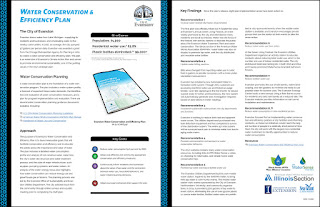Posted July 1st, 2015 in
Water Resource Economics Municipalities throughout Illinois have been making determined efforts to conserve water though policy changes, education, outreach, and water-loss reduction strategies. The Illinois Section of the American Water Works Association (ISAWWA) Water Efficiency Committee and IISG assembled seven case studies from the ISAWWA Water Saver award applications to highlight water efficiency achievements. Evanston is our first story.
Evanston, a city of 74,500 that sits along Lake Michigan north of Chicago, developed a Water Conservation and Efficiency Plan through a grant from the Chicago Metropolitan Agency for Planning Local Technical Assistance Program.
As a result of this plan, Evanston began to educate residents on how to reduce wasted water. It distributed toilet leak detection testing kits, promoted
WaterSense-branded bathroom fixtures, and encouraged drinking tap water. Evanston provided 9,300 gallons of tap water at city-sponsored events in 2014, eliminating the use of over 99,000 plastic 12-ounce bottles.
In addition, Evanston purchased new leak detection equipment and has completed a survey of the distribution system. The entire 157 mile system will be surveyed each year to minimize water loss due to aging water mains.



